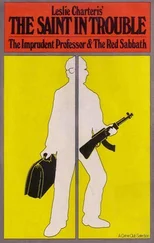Finally Mimette stopped and ushered the Saint into a small sitting-room. It was comfortably furnished with the sort of heavily upholstered Napoleonic sofas that were designed to relax on rather than to admire. In contrast with the other areas that he had seen, it was a room that was obviously lived in, the kind that is found behind doors marked Private in stately homes and is a mile removed from the imposing suites with their Louis XV and Chippendale which are on show to the paying public. A pair of plain glass doors opened on to a patio beyond which was a neatly clipped lawn that stretched between banks of flowering shrubs to the remains of the castle’s outer walls. In the centre was an ancient well that might have once served the beleaguered knights.
Mimette told him that she would not be long and left. The Saint stretched himself full length on a sofa from which he could look out of the window and thought over the events of the previous hours.
His involvement had happened so swiftly, through a chain of circumstances that no solvent bookmaker would have laid odds about, that he felt slightly like a canoeist who had been pitched into the centre of the rapids and now, between rocks, could take advantage of a lull to study the river around him.
It was, to say the least, an intriguing situation. A noble family plagued by a curse that was being helped to work by a couple of small-time crooks. A proud and beautiful young woman too well aware of her station to show her emotions openly, but most certainly a very frightened female. A magnificent house that had about it a feeling of foreboding as if even the walls were waiting for something to happen. Plus, for good measure, a professor trying to understand some sort of primitive tombstone. It was like a crossword puzzle with only half the clues and no black squares.
It was, as Mimette had so bluntly pointed out, no business of his; but if the Saint had always minded his own business there would have been very few stories to write about him.
“The game’s afoot,” he quoted to the pleasant garden he was staring at. “But what’s the game?”
He was still no nearer to an answer when Mimette returned carrying a tray on which were a bowl of hot water, a jar of pink-coloured ointment, and a roll of gauze. The Saint rolled up the right sleeve of his shirt and removed his improvised bandage.
Mimette held his hand and carefully bathed his blackened palm. When she had cleaned it she looked up at him sharply.
“This burn is really almost nothing,” she accused.
“That’s what I thought,” he said shamelessly.
“Then why did you—”
“But it was a wonderful excuse to spend more time with you, and to have you hold my hand.”
She released the hand quickly as an elderly lady in a black dress that bulged in all the wrong places entered with the whisky, a siphon, and glasses. The Saint guessed that she was the spouse of the retainer who had opened the door for them. If possible she was even more self-effacing than her husband. She placed the silver salver on a table beside the sofa and left without a word. Mimette never even looked at her and the Saint’s smile of thanks went unnoticed.
“I ought to have you thrown out,” Mimette said as the door closed.
“Why not?” Simon concurred helpfully.
“Because I am beginning to think I have heard your name before.”
“And you think I might be a distant relative — or too much for Charles to handle?”
Her eyes searched his face.
“You are called the Saint, n’est-ce pas?”
“By some people. But what are you afraid of?”
His question was intentionally ambiguous, but her first choice of answers was not the one that he was aiming for.
“You are a pirate. You rob people. They say you have even murdered some.”
“ ‘Pirate’ sounds so much nicer than ‘thief.’ Thank you,” he replied calmly. “Though I suppose whichever word you use it comes to the same thing. But I’ve never robbed anyone who didn’t deserve it, and there are some people who are enormously improved by death.”
Mimette poured out one liberal Scotch and a token spoonful in the other glass. The Saint sipped his drink and allowed her time to marshal her thoughts. When she finally spoke her voice was husky and uncertain.
“I must not forget that at this moment we are in your debt. But what do you really want from us?”
“Well, as you can see, even if I’m not critically injured, I got myself a bit messed up. If you felt truly hospitable, you’d offer me a bath and a chance to change my clothes.”
As soon as the words were out he cursed himself for his casualness. Mimette rose at once and pulled a bell sash. She did not return to her seat but walked to the window and stood with her back to him looking out across the lawn.
“Mimette,” he said gently, “believe me, I want nothing from you or your family. It was purely an accident that brought me here. Or a whim of fate. But I know now that you’re in trouble. I might be able to help. I’d like to if you’d let me. But you would have to trust me. Could you trust me?”
The Saint concentrated every ounce of his personality into his voice, speaking his words of reassurance quietly but firmly, staying where he was rather than pressuring the girl by moving closer.
For a full minute she continued to stare out into the garden, until at last she turned and met his eyes. When she spoke there was a strange weariness behind her response.
“Why not? What have I got to lose?”
She walked slowly back to the sofa and sat down.
“I’m not sure where to start. It all seems so inexplicable. Someone is trying to make us bankrupt, to force us to leave Ingare. I think...”
But the Saint was not yet to know what she thought. The rap of a discreet knock and the opening of the door made her stop abruptly, as the man-servant entered.
Mimette stood up, becoming once again the ice-blooded mistress of the house.
“Charles, will you take Monsieur Templar to a guest room and run a bath for him. When he is ready, show him to the main salon.”
The servant held the door open and there was nothing for Simon to do but go with him. With a parting nod to Mimette he turned and trailed the major-domo up to the second floor and through another minor labyrinth to the chamber assigned to him.
The Saint wondered about the daffodil painted on the centre of the door but its significance became apparent as soon as he entered the room. It was completely decorated in varying shades of yellow. Curtains, carpet, bedspread were all pale gold, while the chairs were upholstered in a lemon-coloured velvet. Even the wardrobe doors were painted with yellow panels. Simon stood for a moment taking it all in.
“The only thing it needs is a canary,” he observed dryly.
“In the old days when servants were illiterate it was found convenient to identify rooms by colour rather than numbers or letters, sir,” Charles explained with the practised fluency of one used to providing the information.
The Saint crossed to the window and looked out while the servant ran his bath. Immediately in front of him was a curved balcony which jutted out over the remains of the castle wall that ran from the château to the tower. From the tower the rear wall ran almost to the other end of the house before meeting a huddle of one-level outbuildings that undoubtedly served for pressing and vatting the wine. Below them would be a series of cellars where the wine would be bottled and stored.
The servant returned from the adjoining bathroom and asked: “Can I help you undress, m’sieu?”
“No, thank you,” said the Saint. “But perhaps you would fetch my valise from the car.”
He handed over the car keys and waited until Charles had gone before starting to remove his shirt. It was not that he was bashful about undressing in front of a stranger, but he had no wish to excite comment, and the six-inch throwing knife strapped to his left forearm would certainly have done just that. After hiding the sheath under a pillow he hung up his clothes and walked through to the bathroom, which was an anachronistic conversion to ultra-modern plumbing.
Читать дальше












